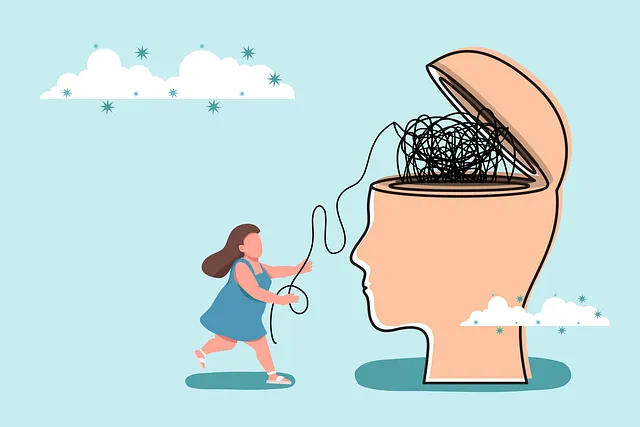Kaiser Permanente in Centennial offers a structured, supportive approach to mental illness, combining advanced diagnostic tools with open communication for personalized care. They provide diverse mental health services, including CBT, mindfulness, and support groups, empowering patients through conflict resolution and confidence-building tools. The network's comprehensive support system includes specialized clinics, therapy, medication management, community outreach, and training for cultural competency, addressing individual needs holistically while prioritizing patient empowerment through effective communication.
“In today’s digital age, addressing mental well-being is more critical than ever. Centennials, in particular, face unique challenges that require accessible and comprehensive support. This article explores how Kaiser, a leading healthcare provider, assists with mental illness diagnosis and treatment navigation. From understanding the process to providing diverse treatment options, Kaiser offers a holistic approach. We delve into their resources, community outreach, and patient empowerment strategies. Discover how Kaiser’s services cater to the needs of young adults seeking mental health support.”
- Understanding Mental Illness Diagnosis: The Process and Kaiser's Approach
- Navigating Treatment Options: What Does Kaiser Provide?
- Supporting Resources: Kaiser's Network and Community Outreach
- Empowering Patients: Tips for Effective Communication with Kaiser Providers
Understanding Mental Illness Diagnosis: The Process and Kaiser's Approach

Mental illness diagnosis involves a comprehensive process that combines patient self-reporting, clinical assessments, and sometimes specialized tests. This journey can be daunting, but organizations like Kaiser Permanente offer structured approaches to streamline the process and provide tailored care.
Kaiser’s method emphasizes open communication as a cornerstone of its mental health services in Centennial. Healthcare professionals employ advanced diagnostic tools while facilitating honest conversations with patients, encouraging them to share their experiences and concerns. This two-way dialogue helps identify underlying issues, whether it’s anxiety, depression, or other conditions. By integrating communication strategies and conflict resolution techniques, Kaiser ensures that patients feel heard and supported throughout the diagnosis process, setting a positive tone for subsequent treatment planning and prevention initiatives, like those focused on depression prevention.
Navigating Treatment Options: What Does Kaiser Provide?

At Kaiser, we understand that navigating mental health treatment options can be overwhelming. That’s why we provide a comprehensive range of services designed to support individuals in their journey to well-being. Our network of specialized professionals offers personalized care tailored to unique needs, ensuring every patient receives the appropriate level of attention and guidance.
We cater to various mental health concerns, from anxiety and depression to more complex conditions. Kaiser’s approach emphasizes evidence-based practices, including innovative therapies like cognitive behavioral therapy (CBT) and mindfulness techniques. Additionally, we foster emotional intelligence through education and support groups, empowering patients with conflict resolution skills and confidence-boosting strategies.
Supporting Resources: Kaiser's Network and Community Outreach

Centennial’s Kaiser network offers a robust support system for individuals navigating mental illness diagnoses and treatment options. With access to a wide range of mental health services, Kaiser aims to provide comprehensive care tailored to each patient’s unique needs. This includes specialized clinics, therapy sessions, medication management, and more.
Community outreach programs play a vital role in Kaiser’s mission, fostering connections between patients and community resources. These initiatives promote awareness, educate the public about mental health, and encourage early intervention. Through partnerships with local organizations, Kaiser ensures that individuals facing stress management challenges, cultural barriers, or social isolation have access to the necessary tools and support networks. Empathy-building strategies, tailored training for healthcare provider cultural competency, and accessible resources empower both patients and caregivers in their journey towards mental well-being.
Empowering Patients: Tips for Effective Communication with Kaiser Providers

At Centennial, Kaiser offers a comprehensive suite of mental health services designed to empower patients and promote healing. Effective communication with healthcare providers is a cornerstone of this process. Patients can maximize their treatment outcomes by actively participating in discussions about their symptoms, concerns, and goals. One key tip is to prepare for appointments ahead of time, jotting down notes on personal experiences, questions, and desired outcomes. This not only ensures that important details are shared but also fosters a collaborative relationship with the healthcare provider.
Furthermore, encouraging open dialogue about treatment options and their potential benefits and challenges can lead to more tailored care plans. Patients should feel comfortable voicing any hesitations or fears regarding specific interventions, such as therapy types or medication regimens. Encouraging self-esteem improvement and positive thinking is also integral, as these attitudes can significantly impact recovery journeys. Additionally, recognizing and discussing cultural backgrounds and preferences with the healthcare provider enhances cultural competency, ensuring that treatment aligns with personal values and beliefs.
Centennial, in partnership with Kaiser, offers a comprehensive navigation assistance program for mental illness diagnosis and treatment. By understanding the process, leveraging Kaiser’s resources, and employing effective communication strategies, individuals can successfully navigate their mental health journey. Kaiser’s approach ensures that patients receive the support and care they need, ultimately fostering better mental well-being.
